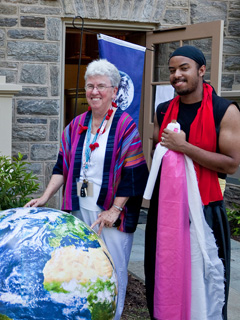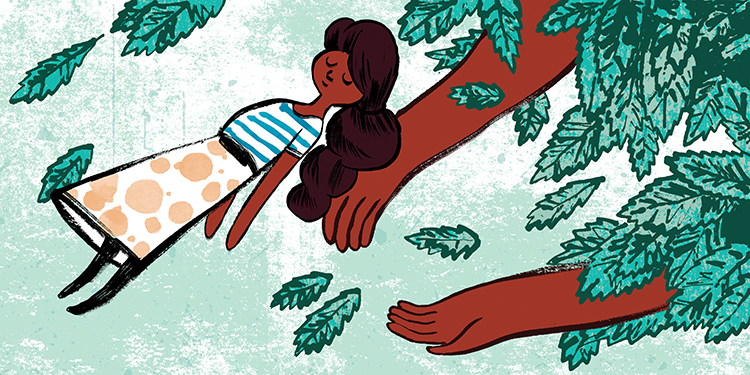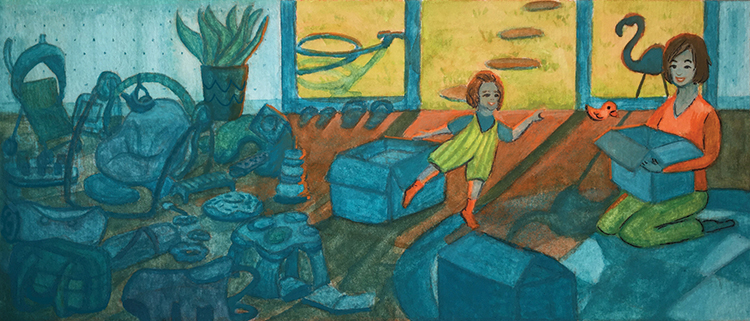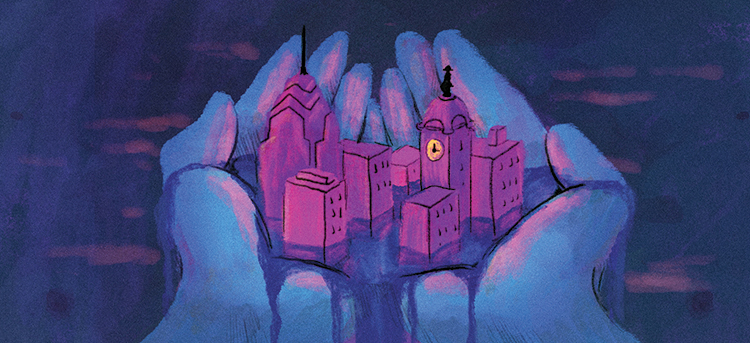 story by Mary Elizabeth Clark, SSJ | photo by Howard PitkowIn my parent’s house, faith and action went hand in hand. For 15 years, my mother met monthly with an interfaith group to discuss the Middle East. Through that organization, she protested the treatment of Russian Jews by wearing black and demonstrating downtown. My parents, both Roman Catholic, raised me with their religion, but taught that “catholic” (lowercase “c”) means all-encompassing. Therefore, Roman Catholics must have an all-inclusive love. With that understanding, I felt a desire to learn about other faiths and traditions as enriching as my own.
story by Mary Elizabeth Clark, SSJ | photo by Howard PitkowIn my parent’s house, faith and action went hand in hand. For 15 years, my mother met monthly with an interfaith group to discuss the Middle East. Through that organization, she protested the treatment of Russian Jews by wearing black and demonstrating downtown. My parents, both Roman Catholic, raised me with their religion, but taught that “catholic” (lowercase “c”) means all-encompassing. Therefore, Roman Catholics must have an all-inclusive love. With that understanding, I felt a desire to learn about other faiths and traditions as enriching as my own.
Another key part of my upbringing was my parents’ concern for the environment. Dad put solar panels on our Glenside house in the 1970’s for hot water. He never passed a paper on the ground without picking it up. We learned to garden in the backyard and, at birthdays and holidays, to give one another gifts from our own belongings.
When I found my calling to become a Sister of Saint Joseph, I quickly felt at home. We all shared a spirit of unity and reconciliation—social justice ideals articulated since the order’s founding. My work centered on helping the vulnerable and in need. I went to South Africa and returned home with a renewed zeal to work on behalf of South Africans to end Apartheid. My ministry took me to the homeless in our own city, as well as El Salvador during their civil war.
I first recognized the connection between Catholicism and the environment in the 1980s when I worked at the Department of Human Concerns in Newark, N.J. During that time, I met Rev. Thomas Berry, a Passionist priest and leader in the eco-spirituality movement. Berry, who passed away in 2009, believed the universe needed a new story of creation—one that included science. This story would define people’s coexistence with Earth, showing humans as united with all of the planet’s species
Around the same time, I met Sister Miriam MacGillis, today a “green religion” leader. In 1980, Miriam had been inspired by Berry’s teachings to start Genesis Farm, an organic farm in Blairstown, N.J. I volunteered there for weekend workshops and retreats, learning from Miriam a new way of “organic” being. As a religious person, she could explain how our life of vows was in harmony with Berry’s new way of thinking about creation. It all made sense. The wonders of a Creator were expanded rather than diminished by such scientific understanding.
I began to see my work in a completely new light. I felt called to include Earth as among those vulnerable and in need. The words of Jesus, “whatever you do to the least of mine you do to me,” had new meaning for me. As my earlier social justice ministry had taken me to El Salvador and South Africa, my new assignment to environmental ministry brought with it another mandate of faith: to mitigate the effects of climate change.
Recently, I became a certified ambassador for the Catholic Climate Covenant to help educate on moral implications of climate change as consistent with the Catholic faith. This is part of my larger mission to educate on the need for people of faith to take action, change our consumerist lifestyle, and see the effects of climate change on the poor.
Today, I view all life through this new lens. I find my work is very much inspired by my parents. Their open views and all inclusive spirit help me see how I can best live my faith. And I’ve realized that my work with interfaith groups on climate change is really a reflection of their own.
Mary Elizabeth Clark, SSJ is director of the Sisters of Saint Joseph Earth Center and assistant to the president for sustainability at Chestnut Hill College.






This article was so encouraging and shows how influential our up-bringing can be.
I knew your mom and dad and I know you, and I feel blessed. Continue your good work.
This article was so encouraging and shows how influential our up-bringing can be.
I knew your mom and dad and I know you, and I feel blessed. Continue your good work.
This article was so encouraging and shows how influential our up-bringing can be.
I knew your mom and dad and I know you, and I feel blessed. Continue your good work.
This article was so encouraging and shows how influential our up-bringing can be.
I knew your mom and dad and I know you, and I feel blessed. Continue your good work.